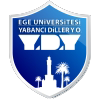Vision & Mission & Values and Principles
The mission of Ege University SoFL, particularly for students enrolled in the Preparatory Class, is to equip them with the necessary foreign language proficiency to successfully follow the courses they will take in a foreign language throughout their undergraduate education by utilizing basic language skills and strategies. Additionally, it aims to nurture individuals who can express themselves on national and international platforms where the foreign language is used as a means of communication, both during their education and beyond.
To be a pioneering institution in foreign language education, in constant and close collaboration with its national and international stakeholders, student-centered, aware of the importance of 21st-century skills, effective in research and educational activities in alignment with its mission and with a strong institutional and academic identity in foreign language education.
As an institution, while pursuing our mission and vision stated above, we are committed to upholding and preserving the following values and principles:
Values
Scientific Approach
Modernity
Reliability
Inclusiveness
Transparency and Accountability
Usefulness
Innovation and Creativity
Principles
Emphasizing academic merit and achievement
Ensuring equal opportunities in education
Focusing on continuous development and quality in education
Being ecologically and socially conscious
Upholding ethics and self-regulation
Utilizing resources efficiently
Following an open and development-oriented management policy with stakeholders
Being fair and consistent in management










